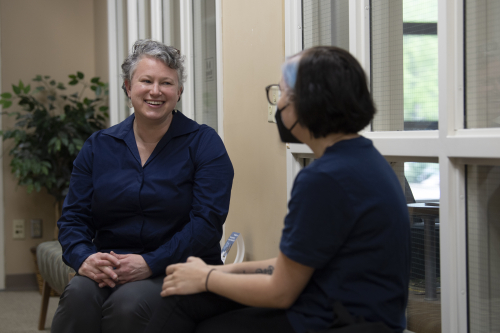Who we are
Student Accessibility at Southwestern Community College works in partnership with students, faculty and staff to eliminate or minimize barriers and facilitate full access and inclusion in the college experience and learning process for students with disabilities.
 |
To achieve our mission:
- The Student Accessibility Coordinator serves as an advocate for students with disabilities while promoting independence, self-determination, and personal responsibility.
- We coordinate and provide accommodations and related support services to students with disabilities.
- We assist the college in complying with the provisions of the Americans with Disabilities Act of 1990 (ADA) and Section 504 of the Rehabilitation Act of 1973.
- We provide training and support for faculty, staff, and administration regarding the needs of students with disabilities.
- We provide consultation, information, and outreach to public school personnel, rehabilitation professionals, parents, and prospective students regarding disability services.
- We assist in transition and career services for students with disabilities.
- We foster campus-wide awareness of the impact of disabilities on individuals.
Disability
Section 504 of the Rehabilitation Act of 1973 and the Americans with Disabilities Act of 1990 (ADA) prohibit discrimination on the basis of disability.
The Federal definition of a person with a disability includes a person who:
- Has a physical or mental condition which substantially limits one or more major life activities,
- Has a record of such condition, or
- Is regarded as having such a condition.
The determination of whether an individual has a disability under the ADA is not based on the name or diagnosis of the condition, but rather on the impact of that condition (the functional limitations) on the life/learning of that individual.
Review the Documentation Guidelines for details regarding disability types and what type of additional documentation may be required to verify a student's disability.
Privacy
All documentation and records provided are maintained in a confidential manner as outlined in the Family Rights and Privacy Act (FERPA) of 1974. Disability information is shared on a limited basis within the College and only when there is a compelling reason for the individual seeking the information to have knowledge of a specific aspect of this confidential information.
Accommodations
Accommodations at the college level do not change the instructional content, the expectations for learning, or the requirements of a task, but they do change how a student accesses information and demonstrates what they have learned. SCC will provide reasonable accommodations to minimize the extent to which a permanent or temporary disability may negatively affect a student’s SCC academic and social opportunities.
View the Accommodations page for examples of common academic accommodations.
If you are a student with a disability, you are strongly encouraged to complete a registration form. If you have questions or need accommodations, contact the Student Accessibility Coordinator at accessibility@southwesterncc.edu.
Report Accessibility Barriers / Celebrate Inclusive Practices at SCC
As a community, we strive to ensure our campus experiences and facilities, including buildings, parking areas, events, classroom experiences, policies, etc. are accessible and free of barriers.
Are you experiencing or have you seen a barrier at SCC? Please let us know so that we can work to resolve the issues through reasonable means of access and accommodation.
- Barriers may include but are not limited to: a broken door activator or automated door; objects blocking access areas; inaccessible events; attitudes or lack of understanding that impose barriers and exclusion.
Alternatively, have you experienced or seen a bridge on campus that demonstrates openness and understanding of accessibility? We want to know about all of the great access opportunities and moments happening at our college.
- Bridges may include but are not limited to: a faculty member who has removed barriers in their courses; a faculty member, staff member, or student who thinks beyond the way things have always been done to consider new ways that include others; attitudes, openness, and understanding that promote access and inclusion.
We will take your report seriously and will do our best to resolve through reasonable means of access and accommodation. We will take this information and notify those who can resolve the matter, contact the person or get involved directly as needed, or contact you if any more questions remain. We cannot promise that every situation will be corrected in an ideal manner or that any action can be taken.
Fill out the report here (opens in a new window). And thank you!
Questions? Contact accessibility@southwesterncc.edu or 828.339.4326.

